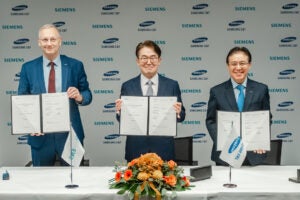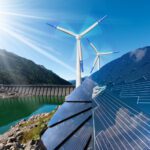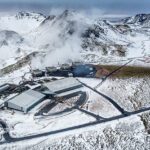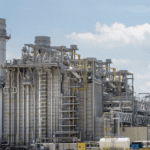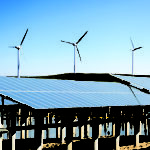Twenty20 Energy Will Build Gas-Fired Plant in Papua New Guinea. Singapore-based Twenty20 Energy Systems in April announced it would design and build a new gas-fired power plant in Hela province, Papua New Guinea (PNG), on behalf of Dirio Gas & Power, a PNG-based utility. The Singapore power company also plans to acquire a stake in the power plant by investing 20% of the required capital for the facility’s construction. Dirio Gas & Power is owned by 11 incorporated land groups and the provincial governments of Hela and Gulf provinces. The 66-MW plant will be built adjacent to the Exxon Mobil Hides gas conditioning plant, from where it will source its gas supply. The power station will be equipped with four 16.5-MW Solar Turbines Titan 130 modular power plant sets, in open-cycle configuration. Electricity generated from the power plant will be supplied via an interconnect to the Ramu Grid, which is currently being extended further into the Highlands region of PNG. The groundbreaking ceremony for the plant is planned for the third quarter of this year, and construction is expected to be completed in 2024. The plant will supply electricity to the Hela region, which often suffers from rolling blackouts. Twenty20 also has agreed to provide operations and maintenance services for the new power plant, in a 20-year contract beginning upon completion of construction and the plant’s commissioning.
New Solar Power Facility Online in Mozambique. French-based independent power producer Neoen has officially commissioned the 41-MW Metoro solar power plant in Mozambique. The project is coming online about two years after being inaugurated in 2020 by Mozambique President H.E. Filipe Jacinto Nyusi. The solar farm, which will supply electricity to the national grid, is located in the northeastern province of Cabo Delgado. The plant includes 121,500 solar panels covering a 341-acre site. It was built by Efacec Power Solutions, a Portuguese energy and engineering company. The plant will feed power to the grid as part of a 20-year power purchase agreement with Mozambique’s state-owned company, Electricidade de Mocambique. A €40-million ($42.25 million) loan was secured by Neoen through Proparco, the private-sector financing division of the French Development Agency, for the construction of the project.
Wärtsilä Builds Major Plant for Production of Bio-LNG. The technology group Wärtsilä will supply equipment for a plant in Germany that will be the world’s second-largest facility capable of liquefying bio-methane and synthetic methane from renewable energy sources to produce carbon-neutral transportation fuel. When operational it will have a capacity of about 63,000 tons of Bio-LNG (liquefied natural gas) per year. The contract for the plant was signed in March 2022 by German energy company REEFUELERY GmbH, a joint venture of Erdgas Südwest GmbH and avanca, a company focused on sustainable energy and logistics solutions. The plant will be located in Burghaun near Fulda, Germany, on a site with direct access to the MIDAL, one of the most powerful gas pipelines in Germany. The central location enables optimum supply to the Alternoil filling stations, which are owned by the avanca group. The plant will utilize biomethane from communal and agricultural waste materials as feedstock. The biomethane is subsequently liquefied and delivered to the Alternoil filling station network as the climate-neutral fuel REEFUEL (Bio-LNG), which can be used in any LNG-fueled vehicle, including heavy-duty transport trucks. The plant is expected to become fully operational during the first quarter of 2024.
Agreements Reached for Green Hydrogen Production in Middle East. Renewable energy producer Masdar has joined with Hassan Allam Utilities to produce green hydrogen in Egypt’s Suez Canal Economic Zone. Egyptian officials approved the production deals in late April. The contracts involve several local and international companies, including Emirati Company Masdar, the General Authority of the Suez Canal Economic Zone (SCZone), the Sovereign Wealth Fund of Egypt (TSFE), the Egyptian Electricity Transmission Co. (EETC), and the New and Renewable Energy Authority (NREA). Masdar will implement its project in partnership with Hassan Allam Utilities, the Cairo-based subsidiary of Hassan Allam Group. The two companies said they plan to establish facilities in the Suez Canal Economic Zone to convert 4 GW of clean electricity into green hydrogen via electrolysis. Masdar said it chose Egypt for the investment mainly due to the country’s potential for renewable energy, including solar and wind. Masdar and Hassan Allam in the first phase of the project will build facilities to produce 100,000 tons of e-methanol annually, by mixing carbon dioxide and hydrogen. The companies said they would expand their capacity to 480,000 tons of hydrogen annually by 2030.
Kosovo Plans Pumped-Hydro Storage Project. The Energy Regulatory Office (ERO) of Kosovo is reviewing an application to build a 250-MW pumped-hydro storage facility in the country. The ERO in late April said the project is one of four planned for construction by Eurokos, a Kosovo contractor. Eurokos signed a grid connection agreement with Kosovo’s transmission system operator KOSTT in 2020 for the pumped-hydro storage project, which is to be sited near a KOSTT substation near Prizren, in southwestern Kosovo. Reports have estimated the cost of the project at about €300 million ($317 million), with another €27 million ($28.5 million) needed to upgrade local transmission infrastructure to serve the project. The other three projects being reviewed by the ERO are biomass, wind, and run-of-river hydro facilities, with total generation capacity of about 50 MW. Kosovo’s government is supporting a buildout of the country’s infrastructure, including roads, bridges, and energy projects. Officials in March announced plans to build a battery energy storage system (BESS) with a capacity of more than 200 MWh to help the country deal with an ongoing energy crisis. Part of the BESS project will be funded from a $234 million grant from a U.S.-based aid agency.
BESS Project Unveiled for New South Wales. Australian renewable energy company Maoneng in early May released details of a proposed energy hub that would include a 550-MWac solar farm, along with a 400-MW/1,600-MWh BESS in regional New South Wales. The project is being designed to address the regional energy supply, as well as the grid stability needs of the National Electricity Market (NEM). Construction of the solar farm and BESS could begin next year and is expected to take 18 months, with the project completed in 2025. The installation is expected to have a 35-year lifecycle. The hub is proposed for a location south of Merriwa, in the Upper Hunter Shire Council area, about 110 miles northwest of Newcastle. The solar array is sited on about 1,900 acres, and would include about 1.3 million photovoltaic solar panels mounted on single-axis trackers, plus associated buildings and infrastructure. It would also involve the construction of a new substation directly connecting to the NEM via TransGrid’s existing 500kV transmission line that runs along the south of the site.
Investment Supports Renewable Energy in Colombia. IFC, part of World Bank Group, in early May said it was investing $10 million in the form of preferred equity in Vatia, a Colombian electricity retailer and aggregator. The investment is targeted for renewable energy development in Colombia. IFC also said it would support Vatia’s effort to obtain financing of as much as $36 million in long-term debt. The agreement is IFC’s first engagement with a retail power aggregator globally. The investment will allow Vatia to acquire greenfield solar assets and strengthen its capital position, expanding and diversifying its generation capacity in Colombia. It is part of Vatia’s effort to help Colombia replace thermal power generation and reach the country’s climate goals, which includes reducing about 55,000 tons of CO2 equivalent emissions each year. In addition, IFC’s investment will enable smaller businesses and commercial and industrial users to implement energy efficiency plans and additional savings. As part of its energy policy, aimed at ensuring energy security, low prices, and reducing greenhouse gas emissions, Colombia wants to receive at least 25% penetration of its energy from renewable resources by 2030.
—Darrell Proctor is a senior associate editor for POWER (@POWERmagazine).






